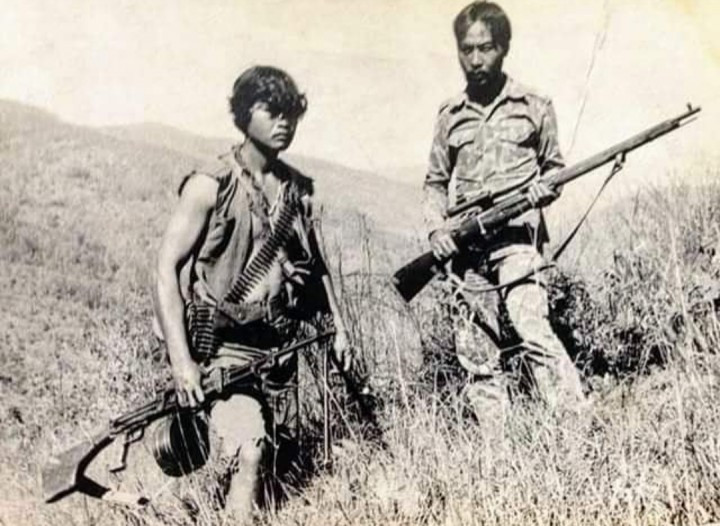HOME | DD
 Mono234 — TRUE STORY OF INDONESIAN INVASION OF EAST TIMOR
Mono234 — TRUE STORY OF INDONESIAN INVASION OF EAST TIMOR

#coldwar #easttimor #indonesia #cubainasia
Published: 2023-04-08 11:58:36 +0000 UTC; Views: 1289; Favourites: 7; Downloads: 1
Redirect to original
Description
1.CARNATION REVOLUTION April 25, 1974, Portugal experienced the Carnation Revolution in which a group of leftist officers overthrew the right-wing dictator Estado Novo. This revolution was caused by economic, social and political instability caused by prolonged colonial wars (Portugal's war budget to defend its colonies in Africa took up to 40% of the state budget). So the ruling military junta immediately made the decision to decolonize. This means that overseas provinces (provinces that are outside Portugal) will have autonomy and join the Portuguese Commonwealth.But towards August, the situation in Portugal became even more uncertain. The junta was suddenly replaced by a group of younger, more radical, more 'leftist' military officers. How will this affect the Portuguese colonies?
The situation in East Timor
Unlike the Portuguese colonies in Africa, East Timor has never had independent aspirations. The Portuguese military has never waged a COIN (counter insurgency) war there. But because of this revolution, local political parties were born. These parties are:
1.The Timorese Democratic Union (UDT), the parties are made up of the priyayi class (civil servants), landlords and traditional elders.
2.The Revolutionary Front for an Independent Timor (Fretilin), the most popular leftist party,that time FRETILIN is Maoist party
3.The Timorese People's Democratic Association (APODETI), not as big as the two parties above, but wants to join Indonesia.
Previously, UDT and Fretilin formed a coalition to run the government. But due to ideological conflict (Fretilin was socialist, at that time people were still as phobic about communists. Meanwhile UDT members were from the upper class who were enemies of socialists/communists), this coalition broke up and East Timor was immediately engulfed in civil war.
Note: Wikipedia blames Indonesian propaganda for inciting UDT to split from Fretilin. But in my opinion, even without Indonesia being involved, if you look at the demography of UDT and the ideology of Fretilin during the Cold War era, when it was 'hot and hot', it was impossible to mix water with oil.
2.INDONESIAN ANXIETYSince the Soekarno era, East Timor has been considered a backwater area by the Indonesian government. BPI (Central Intelligence Agency, intelligence in the Soekarno era) only minimally monitored.
However, after the Carnation Revolution occurred, Jakarta began to monitor developments in Portugal and East Timor with concern. Several Indonesian intelligence officers went in and out of East Timor to observe the political trends of the public and factions in East Timor.
What is also worrying is that several Portuguese military officers who clearly adhere to the left have made visits to East Timor to accompany the military governor of East Timor. This worried the Indonesian intelligence community, at a time when communism was on the rise in Southeast Asia (at that time, the governments in South Vietnam, Cambodia and Laos were dying and would soon be overthrown by the communists). So the concern that East Timor will become the new communist country in Southeast Asia makes all Indonesian intelligence radars sensitive.
At this time, Bakin (Badan Koordinasi Intelijen Negara, "State Intelligence Coordinating Agency") (under the leadership of Yoga Sugama) and Indonesian National Armed Forces Strategic Intelligence Agency (Indonesian : Badan Intelijen Strategis Tentara Nasional Indonesia) abbreviated BAIS (under the leadership of General Leonardus Moerdani) already had intelligence missions in East Timor, especially to train Apodeti who wanted integration. (if you want to google, please search for "Operation Komodo" and "Operation Flamboyant").
The outbreak of civil war and the unclear direction of Portuguese policy increasingly worried Jakarta. Suddenly, in February 1975, a Portuguese military attache named Major Antonio Joao Soares made a diplomatic visit to Dili. The joint intelligence team consisting of Bakin (Badan Koordinasi Intelijen Negara, "State Intelligence Coordinating Agency") and Indonesian National Armed Forces Strategic Intelligence Agency (Indonesian : Badan Intelijen Strategis Tentara Nasional Indonesia) abbreviated BAIS (including several teams from Kopassus) immediately moved to intercept the contents of the attache's suitcase. This is a rather long story. In essence, Soares was tricked into being late and missed his flight to Dili, made it difficult for Immigration in Bali to fill out various forms, meanwhile his luggage was opened by an intelligence team who were experts in locks, photographed all the documents, and returned to normal without the owner realizing it. It was from there that the Indonesian government finally found out that Portugal intended to cut off all matters with East Timor, not to create a Commonwealth for its former colony. Anyway, Portugal wants to leave, no longer wants to take care of East Timor.
This means that Jakarta is faced with the possibility that an unmanaged East Timor will become a black hole of civil war. Or even worse, East Timor will become a "red hole", a communist state in Indonesia's backyard. Having a communist country behind our back wall is the same as making it easy for the Soviet Union to peep and send the virus into our homes. RI does not want Cuba in this archipelago.
3.UNITED STATES AND AUSTRALIA BLESSING
Actually the invasion of East Timor (Operation Seroja) was illegal. But getting the blessing of Western countries, especially the US and Australia, for considering the expansion of communism in Southeast Asia.
US President Gerald Ford is in a bad mood. Cambodia was controlled by the Khmer Rouge. Laos is already a communist country. South Vietnam had united with communist North Vietnam. On December 6, 1975 morning President Gerald Ford visited Indonesia.
President Ford, Foreign Minister Henry Kissinger and President Soeharto held a closed meeting. Outside the room LB "Benny" Moerdani who was the head of Bais (ABRI intelligence) at that time was waiting in the lobby. A member of the NSC (National Security Council, a team within the US president's cabinet) Brent Scowcroft approached Benny, then asked bluntly, "Uh, are you going to use US weapons or not?" Benny knew the US had a super intelligence infrastructure, he must have known ABRI's plans. Benny already knew their worries, but he answered frankly, "Our military is built based on the US system. We have no other choice." Even though actually Kogasgab (the Joint Task Command that carried out Operation Seroja) had prepared US weapons to be used only as backups.
An hour later Suharto, Ford and Kissinger came out. Kissinger approached Benny, asking matter-of-factly, "This little game of yours, how long will it take?" Benny replied confidently, "A few weeks." Kissinger replied, "Please wait until we leave Indonesian airspace, okay?" And that's what happened. After Air Force One left Indonesia, Operation Seroja just started rolling.
From the events above we can see that the US gave its blessing but covertly, because they knew the international legal implications of RI annexing East Timor. The foundations are hard to fight for. But the US and Aussie are silent because they need someone to do the dirty work, and because RI is the one who has the most interest, it is RI that does the dirty work.
Operation Komodo and Operation Flamboyan are intelligence operations and special operations, so it is only natural that they are carried out covertly. But Operation Seroja was a massive invasion by air and sea, and the Indonesian government covered it up from all news because yes, it had no strong legal basis. I remember my father had a friend who was an airborne soldier in Operation Seroja. Wounded soldiers were not sent home to their families after recovering, but were "held" in the hospital so that information about the war would not leak out. As far as I know, it was only after Operation Seroja was completed that East Timor was inaugurated as the Republic of Indonesia number 27 on the grounds that its people really wanted to join Indonesia because they were afraid of communist Fretilin (the people = Apodeti, UDT and other anti-Fretilin parties).
Later, after the Cold War was over, communism-phobia disappeared, and human rights violations committed by ABRI in East Timor were leaked out (especially after the Santa Cruz incident), the US and Aussie turned their backs on condemning the annexation of East Timor.
East Timor finally became independent from Indonesia in the era of President BJ Habibie who allowed a referendum in 1999.
from book "INSIDE INDONESIAN INTELLIGENCE SERVICE" AND "INSIDE INDONESIAN SPECIAL FORCES" BY KENNETH CONBOY
























